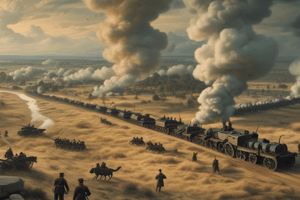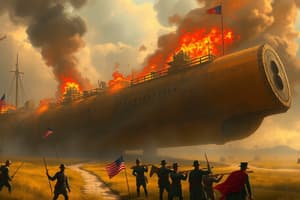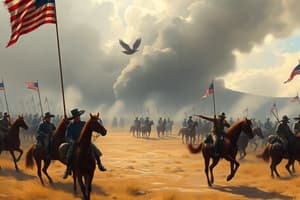Podcast
Questions and Answers
What was the Anaconda Plan?
What was the Anaconda Plan?
- A cavalry charge against the South
- A plan to strike at Confederate cities
- A military strategy proposed by Union General Winfield Scott (correct)
- A naval blockade of the Confederate littoral (correct)
Who was George McClellan?
Who was George McClellan?
A general for northern command of the Army of the Potomac in 1861.
Who was Ulysses S. Grant?
Who was Ulysses S. Grant?
An American general and the eighteenth President of the United States.
Who was David G. Farragut?
Who was David G. Farragut?
What was the Battle of Shiloh?
What was the Battle of Shiloh?
What was the USS Monitor?
What was the USS Monitor?
What was the significance of the Battle of Antietam?
What was the significance of the Battle of Antietam?
Fort Sumter was a federal fort that marked the start of the Civil War.
Fort Sumter was a federal fort that marked the start of the Civil War.
What did the first Battle of Bull Run demonstrate?
What did the first Battle of Bull Run demonstrate?
Who was Stonewall Jackson?
Who was Stonewall Jackson?
What was Robert E. Lee's position on secession?
What was Robert E. Lee's position on secession?
What if Virginia had not seceded from the Union in 1861?
What if Virginia had not seceded from the Union in 1861?
Why was Virginia important during the Civil War?
Why was Virginia important during the Civil War?
How did the North's military strategy change?
How did the North's military strategy change?
What were General McClellan's major tactical errors?
What were General McClellan's major tactical errors?
Was Lincoln's decision to fire McClellan a good one?
Was Lincoln's decision to fire McClellan a good one?
Why did Jefferson Davis choose to go to war?
Why did Jefferson Davis choose to go to war?
Flashcards are hidden until you start studying
Study Notes
Anaconda Plan
- Proposed by Union General Winfield Scott during the Civil War.
- Focused on a naval blockade of the Confederacy, control of the Mississippi River, and land forces to weaken the South.
George McClellan
- General of the Army of the Potomac in 1861, known as "Tardy George."
- Notable for his hesitancy to advance toward Richmond; faced defeat against General Lee.
- Removed from command by President Lincoln twice.
Ulysses S. Grant
- Prominent Union general in the Civil War and later the 18th President of the U.S. (1869-1877).
- Gained recognition for his leadership and strategy in crucial battles.
David G. Farragut
- Admiral in the Union Navy noted for his pivotal role in the capture of New Orleans.
- His actions enabled Union control over the Mississippi River.
Battle of Shiloh
- Fought under Grant's leadership to seize vital railroad routes.
- Marked significant resistance from Confederates, indicating a prolonged conflict was ahead.
USS Monitor
- First ironclad warship commissioned by the Union Navy, completed in early 1862.
- Featured innovative design that represented advancements in naval warfare.
USS Merrimack
- Originally a steam frigate, became known for its transformation into the ironclad CSS Virginia.
- Participated in the Battle of Hampton Roads, marking a historical engagement between ironclad vessels.
Battle of Antietam
- The first major battle fought on Northern soil, noted as the bloodiest single-day battle in U.S. history with around 23,000 casualties.
- The Northern victory led to the announcement of the Emancipation Proclamation by Lincoln.
Fort Sumter
- A federal fort located in Charleston, South Carolina.
- Its bombardment by Confederate forces signaled the commencement of the Civil War.
First Battle of Bull Run
- The first significant battle of the Civil War, resulting in a Confederate victory.
- Observed by civilian spectators; highlighted the war's expected length and complexity.
- General Thomas "Stonewall" Jackson was instrumental in turning the tide for the Confederacy.
Stonewall Jackson
- Renowned Confederate commander recognized for his leadership during the First Battle of Bull Run.
- Died in battle at Chancellorsville due to friendly fire.
Robert E. Lee
- Confederate general against the use of force to maintain the Union, despite personal opposition to secession.
- Played a critical role in commanding Confederate forces and strategizing battles.
Virginia's Role in Secession
- Virginia's secession influenced other Southern states like Arkansas, North Carolina, and Tennessee.
- Its resources, including ironworks and population, were significant for the Confederacy.
Virginia as a Symbolic Battleground
- Held strategic military and industrial importance during the Civil War.
- Capital of the Confederacy; critical for defense and resources.
North's Military Strategy Changes
- The North began to adopt a more aggressive approach in military engagements.
General McClellan's Tactical Errors
- Oversaw critical underestimations of Confederate troop strength and was overly cautious.
- Failed to leverage the full potential of his own army, impacting battle outcomes.
Lincoln's Decision to Fire McClellan
- Viewed as justified due to McClellan's significant errors during wartime.
- Reflects the urgency and necessity for decisive leadership during a civil conflict.
Jefferson Davis' Decision for War
- Chose to engage in war to protect the image and integrity of the Confederacy.
Studying That Suits You
Use AI to generate personalized quizzes and flashcards to suit your learning preferences.




